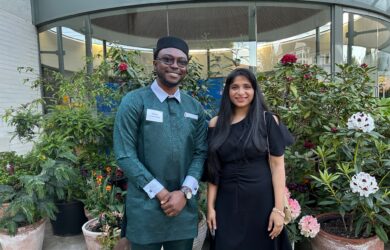New research by Alex Davies looks at the use of emoticons on Twitter.
The emoticons used on Twitter are a language in themselves and are taking on new and often surprising meanings of their own, according to new research by a Gates scholar.
Alex Davies [2010] has created a visual map of the words associated with Twitter emoticons. It’s not just the usual smiley and sad face emoticons whose meaning is fairly obvious and associated with words such as birthday, weekend and Friday and hospital, cold, stomach and pain respectively.
Other emoticons include:
^_^ This is associated with more immediate pleasures such as food and holidays. Words linked to it include shopping, lunch, dinner and chocolate. It is more associated with Asian Tweeters, but has begun to be used more in the West.
<3 This emoticon, which looks like a heart on its side, is associated with words such as love, music, amazing, proud, beautiful, thankful, Jesus and Justin.
:/ This generally denotes a half-awake, slightly annoyed state, associated with words such as shift, sleeping, busy, class and Monday.
-_- This emoticon is indicative of frustration and is associated with words such as dumb, lame, dick and bitch.
Davies says all the emoticons he has analysed have been around for at least as long as the Internet has been in existence, but some are less prevalent than others. Some were used exclusively in Asia, but have now spread to the West, and being adopted by particular groups.
Davies, who is studying for a PhD in Engineering with a focus on statistical modelling, says: “The creation of new emoticons has essentially stopped, but the context and usage of existing ones is constantly evolving. Take for example Asian style emoticons, such as ^_^ (happy) and -_- (sad).
“Initially these were used almost exclusively by Asian online communities, but have slowly been adopted by different Western sub-cultures and have taken on subtly different meanings in these contexts. One way to visualise this usage is to visualise the words that are strongly associated with these emoticons. What is interesting is that two emoticons that essentially represent the same sentiment, such as 🙂 and ^_^, actually differ substantially in how they are used, and we can see this in the images of the words.”
Davies has also published a list of the happiness/sadness of 7,500 common words on Twitter after he was approached at an international conference about his previous work on creating a Twitter map of happiness. He was asked if he could release a list of words so people could easily create systems that use sentiment analysis of Twitter.
Davies says: “Twitter contains a wealth of sentiment information which researchers and businesses are very interested to explore so they can assess the changing global mood on different issues in real time and make predictions based on this.”
For the images of words that are associated with emoticons on Twitter – http://alexdavies.net/2011/10/what-your-emoticon-means-on-twitter/
For the list of the happiness/sadness of 7500 common words on Twitter, go to http://alexdavies.net/2011/10/word-lists-for-sentiment-analysis-of-twitter/
For more information on Alex Davies’ Twitter map of happiness, see http://gatescambridge.org/media/news/detail.asp?ItemID=13151
Read Alex’s blog on his research and his opinion piece in the Huffington Post.












